The Checker Maven
The World's Most Widely Read Checkers and Draughts Publication
Bob Newell, Editor-in-Chief
Published every Saturday morning in Honolulu, Hawai`i
Noticing missing images? An explanation is here.
CV-5: Brian's 8x8 Mindbender

Our special Wednesday CV series is intended to provide a little extra checker entertainment during difficult days. Our fifth problem, CV-5, comes from master composer Brian Hinkle. He didn't give this composition a title, and just points out that it's an 8 by 8 (eight pieces per side). We call it a "Mindbender." Keep in mind that the CV problems are intended to be challenging!
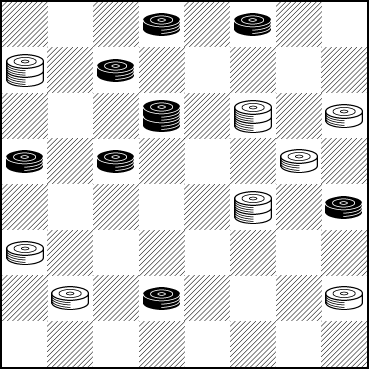
WHITE
White to Play and Win
W:WK5,K11,12,16,K19,21,25,28:B2,3,6,K10,13,14,20,26K
You'll have two weeks to solve it, at which time we'll publish the solution. Good luck, and stay safe and healthy, checker fans, wherever you are.![]()
Solution to CV-4: Donnybrook
BLACK
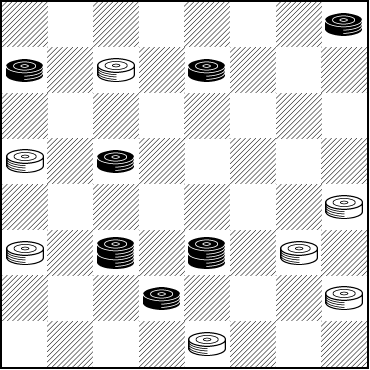
WHITE
White to Play and Win
W:W6,13,20,21,24,28,31:B4,5,7,14,K22,K23,26
24-19 23x16 20x2 14-17---A 21x14 22-17 31x22 17x1---B 28-24---C 4-8 24-19 8-12 2-7---D 5-9 13x6 1x3 22-18 3-7 18-15 White Wins---E.
A---Black has a wide variety of possible moves here, but this 2 for 2 may give him the best chance for a draw over the board.
B---White seemingly has a crushing grip on the game, but in fact very precise play is necessary.
C---Moving the piece on 22 or playing 2-7 would give Black a 2 for 1.
D---But now White can and indeed must give Black a 2 for 1.
E---Winning with the move.
Problem composer Ed Atkinson notes that all White moves are star moves, and says of his problem, "This one has been described as 'weirdo' by a well known problemist and as 'psycho' by an expert player and solver."
We'd prefer to just call it "unique and entertaining." We hope you enjoyed it, and our thanks to Ed for sending it our way.![]()
A Bittersweet Day at The Beacon Cafe
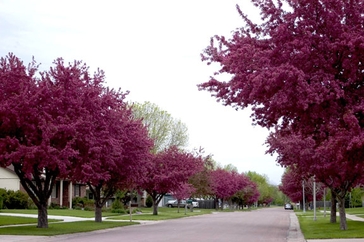
It was Saturday, May 21, 1955, and for Sal Westerman of Bismarck, North Dakota, it was a bittersweet spring day. His beloved group of checkerists, The Coffee and Cake Checker Club, would meet today as they did every Saturday, at one o'clock at the Beacon Cafe in the Provident Life Building.
Sal was always happy to have Saturday come around, and spend some good checker time with the "boys" (all of them over 50) who made up the club. Yet it was the Saturday before Memorial Day, which this year fell on a Monday and made for a long weekend. That meant this was the last meeting of the club until the Saturday after Labor Day--- more than three months away.
Summer in North Dakota was short, and pretty much all regular activity, outside of work and church, ceased. There were no dance groups, no crafts classes, no book clubs ... and no checkers at the Beacon.

Ted Harman
There was a good turnout for the closing meeting of the season. Wayne, Tom, Dan, Louie, Sam, Delmer, and even infrequently seen Ted were all there. That made eight, counting Sal, and they overflowed into a second booth adjacent to the large booth in the back that they always occupied.
Deana, the proprietress, would miss the club as well. They brought her some good business on slow Saturdays. In fact, she would even close on Saturdays from mid-June through mid-August. Today, though, she had baked a large tray of one of her all-time favorites: chocolate chip almond bars. She charged a little extra for them--- they were twenty cents a serving instead of fifteen cents--- but no one complained.
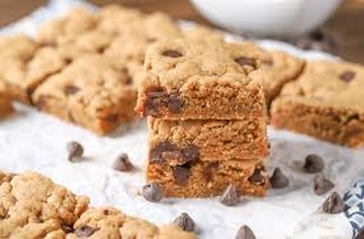
When everyone was settled in with mugs of Deana's coffee, Sal announced that he had a problem from Ed in Pennsylvania, one that Ed said would go well with next week's Indianapolis 500 auto race. "Ed calls it 'Photo Finish'," Sal remarked. "He originally had in mind the Kentucky Derby, but you'll see when you solve it." Sal paused and chuckled. "If you solve it, that is." Sal turned and looked over at the baked goods case. "Those bars look really fine."
That got a smile out of Deana. "Sure are," she said. "A real deal, too."
Sal laid out the problem setting, once in the big booth and then again on another board in the adjacent booth.
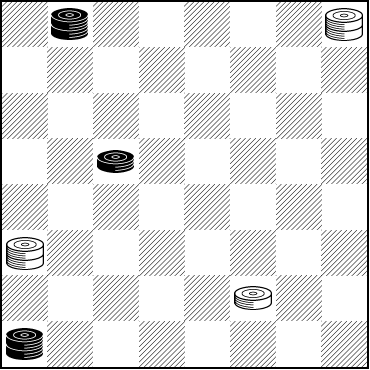
BLACK
White to Play and Win
W:WK4,K21,27:BK1,14,K29
"How long should I give you boys?" he asked, and then answering his own question, said, "Twenty minutes. After that, one of you buys the bars. And more coffee, too."
At first there was silence as the boys examined the position. Then there was discussion, starting with a few suggestions but becoming more and more lively as time passed. Delmer was arguing with Wayne, Sam was getting impatient with Louie, and Dan, Ted, and Tom were trying to solve as a trio.
Finally, it was Ted who spoke up. Over eighteen minutes had passed and Sal was closely watching the clock.
"I have the answer," Ted said, but his voice didn't sound confident at all.
"Glad to hear that, Ted," Sal said. Was there a tiny note of sarcasm? "Let's see it."
"Uh, sure," Ted said, and started to move the pieces.
It's the last chance until September to win some of Deana's famous bars. Can you do it? Do you think infrequent player Ted has found the solution?
You can take your time--- there's no need to race to the finish--- and when you're set, click on Read More for the solution and the conclusion of the story.![]()
Logical Checkers Volume Four
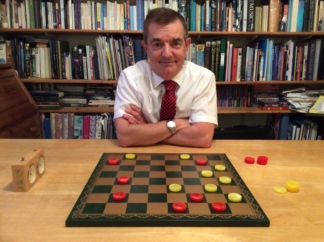
It's here! The fourth volume of Richard Pask's projected five-volume Logical Checkers series, entitled Checkers for the Three-Move Expert: Balanced Ballots is available to download in PDF format here or from the "Richard Pask" page as linked in the right-hand column. Of course, the book is completely free of charge, as are all the ebooks in the series.
Volume Four provides in-depth coverage of selected endgames, advanced tactics, mid-game landings, and of course balanced three-move ballots. The book is over 200 pages in length, with many examples, illustrative games, and diagrams.
Looking forward, we anticipate seeing Volume Five as early as the end of 2020, with a mammoth print volume of the whole series projected for later on in 2021.
Our thanks go to Grandmaster Pask for the opportunity to publish his works, and for his generosity in providing them gratis to the world-wide checker-playing community.
As a teaser, here's a position found in the book.
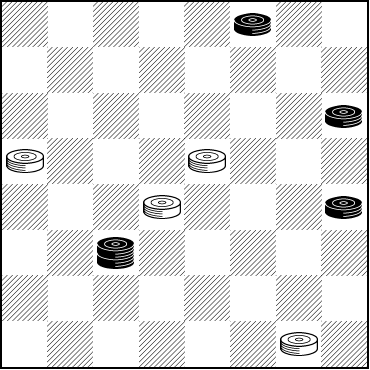
WHITE
White to Play, What Result?
W:W13,15,18,32:B3,12,20,K22
For the solution, see page 123 of Richard's new book.![]()
CV-4: Donnybrook
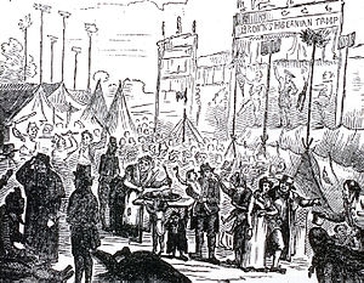
Our ongoing series of special Wednesday columns, intended to provide a little extra checker entertainment when we need it the most, continues with another fine and tough problem from master composer Ed Atkinson. He named it after Donnybrook Fair, which was known for its frequent brawls. If you solve this problem, you'll see why the title is appropriate.
BLACK

WHITE
White to Play and Win
W:W6,13,20,21,24,28,31:B4,5,7,14,K22,K23,26
Be forewarned; this is a doozy! Once again, you have two weeks to work on it before we publish the solution.
We hope you are enjoying this series. Stay safe and healthy, checker fans, wherever you are.![]()
Solution to CV-3: Sturges Remembered
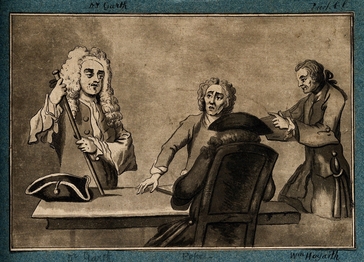
Two weeks back, we presented Ed Atkinson's "Sturges Remembered" problem. We said that the title might give a slight hint toward the solution. Judge for yourself.
BLACK
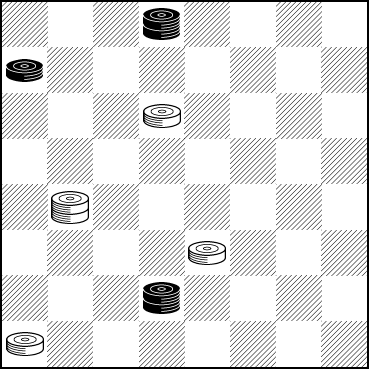
WHITE
White to Play and Win
W:B5,K2,K26:W10,23,29,K17
1. ... 23-19 2. 26-23 19-16 3. 23-19 16-11 4. 19-15 10-6 5. 15x8---A 17-13 6. 2x9 13x6 7. 8-12 6-10 8. 5-9 29-25 9. 12-16 10-15 10. 9-14---B 25-22 11. 14-18 15-11 White Wins---C.
A---The order of the jumps is immaterial.
B---Ed informs us that this is now into a problem by--- Joshua Sturges!
C---18-25 11-20 winning with the move, or 16-7 22-15 likewise, with the single man trapping the king!
Ed points out that all of White's first 10 moves are star moves--- no other moves will garner the win.
Our thanks to Ed for this fine composition.![]()
The Merry Month of May

It's May and summer is just around the corner. We're writing this in March so we don't know how late winter and early spring unfolded, but we're hoping that everyone came through it in good health and spirit. We trust that some merriment will be in order, perhaps such as a beautiful walk in the park, followed by this nice checker problem sent along by Josh and Lloyd Gordon of Toronto.
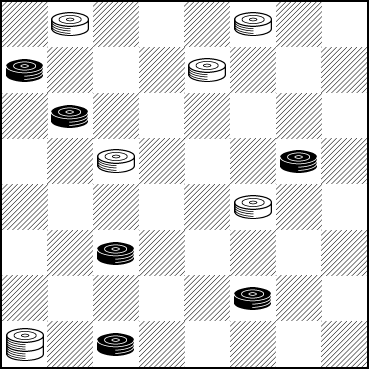
BLACK
Black to Play and Draw
B:WK4,14,19,26,30,32:B3,6,11,17,24,28
White has the first king but it's trapped in the corner, so maybe Black can pull off the draw. The problem itself isn't all that tough, although it's a little bit beyond the strict "speed" category. So take as much time as you need, after which you "may" click your mouse on Read More to see the solution.
Stay safe and well, checker fans, wherever you are.![]()
April in Bismarck
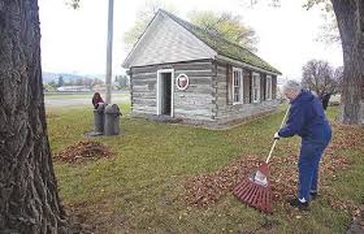
The year was 1955 and it was the first Saturday of April. In the city of Bismarck, North Dakota, that day had special meaning.
No, it didn't have anything to do with April Fool's Day, which only fell on Saturday once in a while. It had to do with raking up your yard after the winter season.
It was practically an unwritten law. On the first Saturday of April, you raked up your yard. Period. It didn't matter if there were still some lingering piles of snow, or even that it was likely to still keep snowing during April. You raked up your yard, and if you didn't, you'd get glares and stares from your neighbors, who were out there doing their duty while you were ...
... playing checkers at the Beacon Cafe?
Yes, the Coffee and Cake Checker Club, led by Sal Westerman, met every Saturday afternoon from September to May at the Beacon Cafe, where they enjoyed a few hours of checker fun and the outstanding baked goods produced by the proprietor, Deana.
Now, Sylvia, Sal's wife of some 45 years, understood. She knew that Sal was 70 and not up to a lot of yard work, so she hired it out to Ted, an enterprising young man in their neighborhood. But it wasn't so simple for the rest of the boys--- Sal referred to the other club members as 'the boys' even though they were all over 50 themselves.
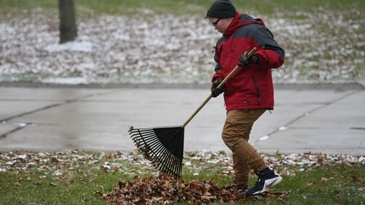
Young Ted
So when Sal made his way to the big booth in the back of the cafe, where the 'boys' always gathered, there was no one present except Wayne and Dan.
"Raked our yard this morning," they both explained, in more or less the same words. "Got up early to get 'er done. Too bad the others are stuck doing it this afternoon."
Of course, the idea of not raking your yard on this appointed day would never occur to any of them. In Bismarck, that was unthinkable.
"Well, okay," Sal said, with a sigh of resignation. "Less treats for the losers to buy, I suppose."

Deana, who missed nothing that went on in her cafe, called over from her counter, "Too bad, I have peanut butter bars today. Really good."
Sal smiled. "I'm sure they are, and in a little while Wayne and Dan are going to buy me one."
"We'll see about that," Dan said. "And hey, did you rake your yard this morning?"
"You know Sylvia hires young Ted to do that."
"Ah, cop out. Anyone who doesn't rake their yard ought to buy treats for those who did, don't you agree, Wayne?"
Wayne nodded. "Sure do. But let's see what Sal has for us today."
"Something from Brian," Sal said, "and he says it's very instructive."
"That's another way of saying 'hard', right?" Dan said.
Brian was Sal's St. Louis checker pen-pal, and his checker problems always puzzled and pleased. But they were seldom easy.
Sal set up the position on one of the checkerboards on the booth's table. "Here you go. Fifteen minutes ought to do it."
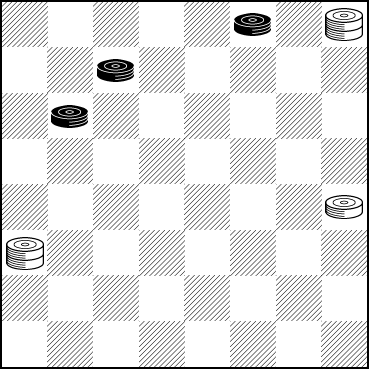
WHITE
White to Play and Win
W:WK4,20,K21:B3,6,9
"Fifteen minutes! No way!" Wayne complained. "An hour, for sure!"
"Half an hour," Sal said, "and that's final." He crossed his arms over his chest and feigned a severe look.
But the boys were already deep in contemplation.
Peanut butter bars sound good, and you can have one if you can solve the problem (or if you've raked up your yard). When you're done, rake your
mouse over Read More to see the solution.![]()
CV-3: Sturges Remembered
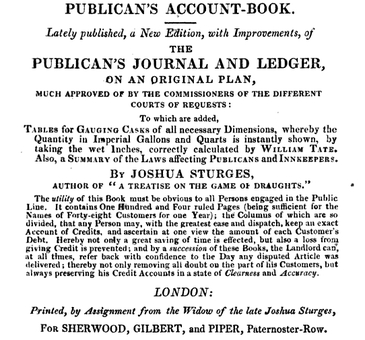
Public Domain
Joshua Sturges is best known to us for his early treatise on the game of draughts, or checkers. But as an innkeeper and proprietor of a "publick house" he was known for other things, including his ledger system for other innkeepers. Truly he was a man of many talents.
We continue our series of special Wednesday columns, intended to present a little extra entertainment during the current public health crisis. Today's problem, CV-3, was kindly provided by master problemist Ed Atkinson. He calls it Sturges Remembered (for checkers rather than innkeeping). That title might give you a small hint for this problem.
Once again we'll hold the solution for two weeks, at which time we'll present problem CV-4.
Without further ado, here's CV-3.
BLACK

WHITE
White to Play and Win
W:B5,K2,K26:W10,23,29,K17
Enjoy solving this one! And stay safe and well, checker fans, wherever you are.![]()
Solution to CV-2: Brian's Bridge
Brian's Bridge
BLACK
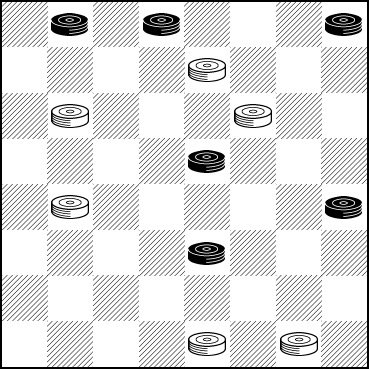
WHITE
White to Play and Win
W:W7,9,11,17,31,32:B1,2,4,15,20,23
We hope you enjoyed solving this excellent problem.
Once again, in a problem this complex, we can only give a main line and a few variations. Feel free to explore with your computer. The following solution is the one preferred by the composer, master problemist Brian Hinkle.
1. ... 7-3---A 2. 1-5---B 17-14 3. 15-18 31-27 4. 23-26 11-8 5. 4x11 9-6 6. 2x9 27-24 7. 20x27 32x23 8. 18x27 3-8 9. 9x18 8x24 White Wins.
A---17-13? 2. 15-19 32-28 3. 4-8 11x4 4. 2x11 4-8 5. 11-15 9-5---C 6. 23-27 31x24 7. 20x27 8-11 8. 27-32 11x18 9. 19-23 18x27 10. 32x23 28-24 11. 23-18 24-19 12. 18-14 19-16 13. 14-10 16-11 14. 10-6 11-7 15. 6-2 7-3 16. 2-6 3-7 17. 6-2 7-11 Drawn.
B---15-18 31-27 3. 1-5 17-14 Same.
C---8-11 6. 23-26 11x18 7. 1-5 31x22 8. 5x23 Drawn.
As always, our thanks go out to Brian.![]()
The Checker Maven is produced at editorial offices in Honolulu, Hawai`i, as a completely non-commercial public service from which no income is obtained or sought. Original material is Copyright © 2004-2025 Avi Gobbler Publishing. Other material is public domain, AI generated, as attributed, or licensed under CC1, CC2,CC3 or CC4. Information presented on this site is offered as-is, at no cost, and bears no express or implied warranty as to accuracy or usability. You agree that you use such information entirely at your own risk. No liabilities of any kind under any legal theory whatsoever are accepted. The Checker Maven is dedicated to the memory of Mr. Bob Newell, Sr.

